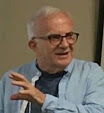This is the second of three meditations about Mary that I gave at Mayflower
Church in Minneapolis, Minnesota on December 11, 2022.
It may surprise you to know
that Mary – or Maryam, as she is known to Muslims – is highly revered in Islam.
There is much more about Mary in the Qur’an than in the Christian New
Testament. Allah (God) has preferred Mary above all the other women of
creation. She is regarded as one of Islam’s four perfect women. She is the only
woman named in the Qur’an. A whole Sura (or chapter), Sura 19, bears her name.
It is recited by all Muslims, and especially favored by women. Its recitation
is believed to impart a special blessing on both the one who recites and the
one who listens.
Although she is the mother of
Jesus, her importance in the religion appears somewhat independent of him. She
is never called “the mother of Jesus,” but Jesus is always called “the Son of
Mary.”
 |
| 'Annunciation' by Raphael Soyer, 1980 |
Maryam’s father died before
she was born. She was raised in the Temple under the care of her uncle,
Zachariah. If you are fortunate enough to visit the Temple Mount in Jerusalem,
your guide may point out the room in which she is thought to have lived. She
grew up on the grounds of the temple, which is now called al-Ḥaram al-Sharīf, the al-Aqsa Mosque compound, or simply the al-Aqsa Mosque. So did Jesus, Muslims believe.
Whenever Zachariah visited Maryam at the Temple, he always was surprised to see that she had baskets of food. Miraculously, it was out-of-season - summer foods in winter, and winter foods in summer. When asked who provided it, Maryam always answered cheerfully. Allah.
The angel Jibril (Gabriel) visited Maryam in an annunciation similar to the Christian story. But unlike the Christian story, there is no husband. She becomes a single mother. During her pregnancy, upright townspeople condemned and shamed her. Maryam left the Temple grounds and went into the desert.
When she went into labor, the pain was so great that she held onto a nearby palm tree. She nearly gave up. A voice came from the ground below. "Grieve not!” it said. “Thy Lord hath provided a stream of water beneath thee; Shake towards thyself the trunk of the palm tree: It will let fall fresh ripe dates upon thee."
As in Christianity, so in
Islam there is a vast body of literature on the subject of Maryam, and many
differing opinions. Some Muslims contend that the virgin birth should be taken
symbolically while others insist on its literal truth. In this religion, so defined
by its prophets, was Maryam also a prophet? Muslims still argue about that too, since all
other prophets were men.
Bishop Fulton Sheen once said
that Mary might be the bridge that reconciles and unites two of the world’s
great religions.
Judith Dupré in her excellent book, Full
of Grace, wrote that “(In) a time when the need to reconcile differing
cultural traditions has never been more urgent, there probably has been no
symbol… in Christendom that can mediate and build bridges with more success and
amplitude than Mary.”
Hail Mary, full of grace. May
it be so.
"The Annunciation" is by Rafael
Soyer (1980).
©Budd Friend-Jones
December 11, 2022
Mayflower Church
Minneapolis, Minnesota












No comments:
Post a Comment